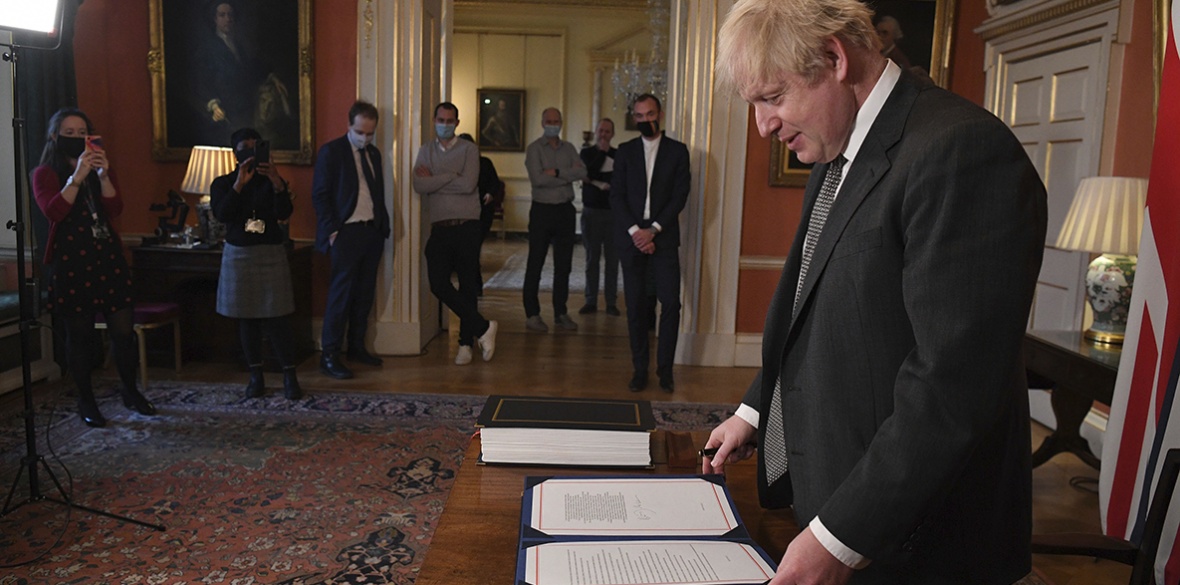This is the last article you can read this month
You can read more article this month
You can read more articles this month
Sorry your limit is up for this month
Reset on:
Please help support the Morning Star by subscribing here
THE trade agreement between Britain and the EU passing today was a foregone conclusion.
Responses on the left to the PM’s deal-or-no-deal offer have varied. Some, including former Labour leader Jeremy Corbyn, strongly defended a vote against it.
As he warns, some of the worst aspects of EU membership are “baked in” to the deal: “This deal does not break free of state aid or public procurement restrictions, or of commitments to competition and privatisation of public services.”
The same grim assessment is shared by the authors of the No Holding Back report, Ian Lavery, Jon Trickett and Laura Smith, who state that it “hardwires Thatcherite economics into Britain’s permanent relationship with the EU.”
Like Corbyn, they note that protections against “regression” on workers’ rights are heavily qualified.
Their analysis highlights parts of the deal which point to potential Tory plans to privatise the NHS and the maintenance of EU competition and state aid laws that prohibit strategic economic planning and many forms of public ownership. It also points to threats to British manufacturing hidden in the “rules of origin” details.
They nonetheless argue for a vote in favour of the deal, on the grounds that the consequences of opposing it would be even worse.
Understanding the deal is important not because it could have been stopped but because it identifies the areas in which the left needs to mount a political challenge to it in order to free Britain from endless Thatcherism.
Votes against the deal from the Lib Dems, Scottish National Party and Greens did not do this because they were votes against leaving at all, and therefore endorse the EU’s neoliberal structures.
A vote for it from Sir Keir Starmer did not do this either, since its logic was simply that any deal was preferable to a no-deal departure.
Starmer’s manoeuvres to ensure Labour voted against every Brexit agreement put to Parliament when Corbyn led the party lie exposed now as more about sabotaging Corbyn’s leadership than deep principle.
Nonetheless, his instinct that an exasperated electorate would see a Labour vote against the deal as a continued refusal to accept the 2016 referendum result is probably accurate.
Given the common ground in Corbyn’s and the No Holding Back team’s criticisms, and the inevitability of its passage in a parliament with a big government majority, it hardly seems worth debating whether Corbyn’s vote against or their recommendation of a vote for was correct. What is important is the issues they raise.
The conclusion of the No Holding Back report calls on Labour to embrace a transformative vision that would break EU rules and those of the agreement too: “We must use state aid, industrial strategy and public investment to build the economy of the future.”
If the pro-EU left were wrong to imagine that rules against such policies didn’t matter, we must not fall into the alternative trap of allowing their existence to constrict our political demands.
We operate in a capitalist society governed by capitalist laws, many of which are designed to prevent the implementation of socialist policies. The struggle against such laws is part of the struggle for such policies.
If that struggle is to be successful, however, the left must learn from the errors that have allowed the right to exploit successive crises of capitalism at our expense.
Socialists must stand for rupture with the capitalist system. Throughout the Brexit process, the tendency to defend the status quo for fear that the alternative will be worse has become a self-fulfilling prophecy.
Even now, votes for the deal are defended as the way to ward off crisis. But if we shy away from demanding breaches of the deal on the grounds that this will precipitate a crisis, we condemn ourselves to permanent bondage. The road to socialism is not paved with corporate treaties between capitalist states.










